Kenneth C. Davis's Blog, page 79
May 19, 2015
June 4-Speaking at the Pritzker Military Museum (Chicago)
On June 4, I will be speaking at the Pritzker Military Museum and Library in Chicago at 6 PM. I will be there to discuss my new book, THE HIDDEN HISTORY OF AMERICA AT WAR:Untold Tales from Yorktown to Fallujah.
I hope you will join me
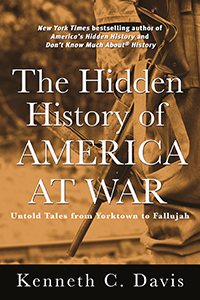
The Hidden History of America At War-May 5,2015 (Hachette Books/Random House Audio)
May 11, 2015
Speaking at Army Heritage Days- (May 17)
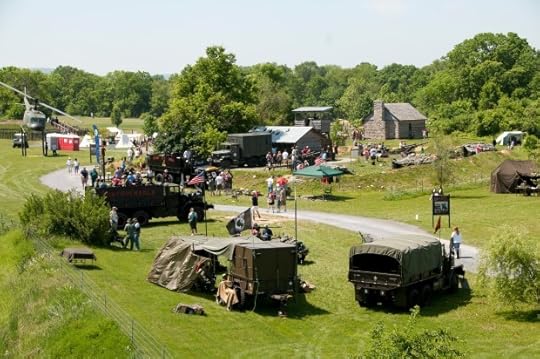
United States Army Heritage and Education Center Carlisle, PA
I am honored to be taking part in Army Heritage Days at the U.S. Army Heritage and Education Center in Carlisle, PA.
I will be speaking on Sunday May 17 at 1 PM. The subject will be the stories the schoolbooks leave out when we talk about war –and who fights our wars.
The Heritage Center’s walking trail through military history, includes a recreation of Redoubt #10 at Yorktown which plays a central role in the opening chapter of THE HIDDEN HISTORY OF AMERICA AT WAR
“Did you know?” from THE HIDDEN HISTORY OF AMERICA AT WAR
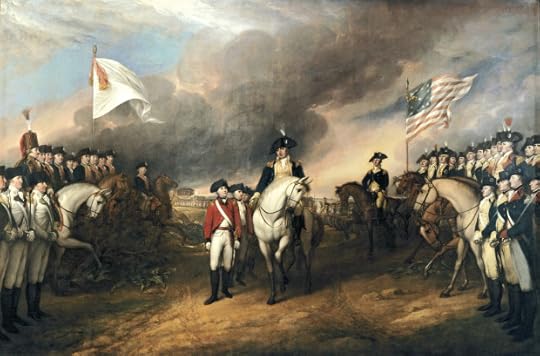
War stories. They help shape a nation’s identity.
But if these stories sweep facts under the rug, they are ‘foundation legends,’ not history. I tell the stories our schoolbooks often leave out, the stories that don’t fit the tidy patriotic version that makes us feel proud but are not always complete or true. The real story – the “warts-and-all-version”—is always more interesting and more instructive.
Here are some “Did-you-know” facts from my newly published The Hidden History of America At War –from the American Revolution to the War in Iraq.
THE AMERICAN REVOLUTION
George Washington gets credit for winning the American Revolution. But without the French Navy, foreign loans and sacrifices by black patriots, the cause might have been lost. Washington, a slaveholder, didn’t want black men in his army. But when he got desperate for troops he opened his ranks to black soldiers and he was impressed at how bravely they fought.
John Laurens isn’t a household name like Thomas Jefferson and John Adams. But this “forgotten founder” helped lead the fight at the decisive battle of the American Revolution at Yorktown, Virginia, and was a voice of conscience who tried to convince George Washington, a slaveholder– to embrace abolition.
The son of a major slave trader, John Laurens was so intent on enlisting blacks in the military that he designed a uniform for African Americans.
It’s inspiring to think that patriotic “Minutemen” grabbed their trusty muskets and left their farms to whip the mighty British redcoats in the American Revolution. But that is not how the Revolution was won. George Washington was wary of the militias who often wanted and needed to get back to their shops and farms. Washington insisted on a trained, disciplined, standing army. Irish and German immigrants, out of work teenagers and African Americans filled the ranks of his Continental Army. But these “rabble” frightened the founding generation. The Minutemen and other militiamen come down in lore as patriots ready to take up arms and defend freedom. But Washington thought militias were undependable, calling them a “broken staff.”
Heroic images of “Washington Crossing the Delaware” don’t hint at what happened later in New Jersey when his drunken troops mutinied –he had the ringleaders executed by firing squad. Washington was a strict disciplinarian who once built high gallows and threatened to hang American deserters.
American troops fought bravely in securing victory over the British at Yorktown. But two overlooked factors helped defeat the British: disease and the burden of harboring refuges, slaves who flocked to the British in hopes of being emancipated.
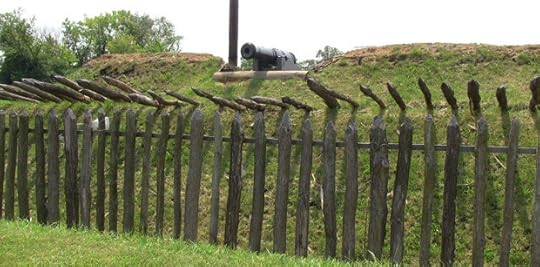
Recreation of Redoubt # 10 at Yorktown (U.S Army War College-Army Heritage and Education Center)
Fear of leaving slaves in charge of the homestead kept men in Virginia and other slaveholding from joining the militia during the Revolution.
Washington and Jefferson made sure to collect their runaway slaves when the Revolution ended. The American Revolution was fought to protect “Life, Liberty and the Pursuit of Happiness.” But insuring the continuation of slavery was high on the list of priorities for the new nation.
After the Revolution, Marquis de Lafayette had a plan to buy land where Washington could free his slaves and set an example of abolition. But Washington never took up the offer.
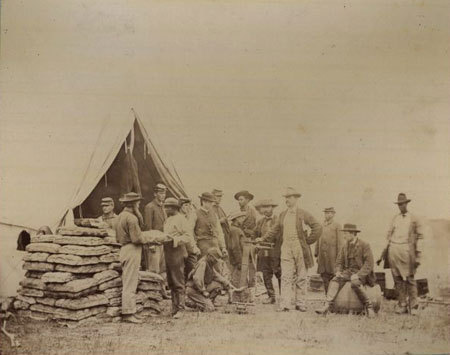
Civil War Commissary Cabin (Source U.S. Army War College/Heritage and Education Center)
THE CIVIL WAR
Military casualties in the Civil War are well documented. But also horrific are the civilian tolls in places like Petersburg, Virginia, which was the scene of a nearly yearlong siege. The situation in Petersburg got so dire for the civilians that some held macabre “Starvation Parties” with no refreshments served. Flocks of local birds disappeared and local butchers sold “mystery meat.”
Lincoln initially resisted letting blacks join the army during the CivilWar. But by the end of the war, “Colored Troops” made up 10% of the Union Army. When U.S. Colored Troops” were admitted to the Union ranks during the Civil War, they often got the dirty work such as collecting the dead bodies and were paid less than white soldiers.
THE SPANISH AMERICAN WAR
President William McKinley couldn’t locate the Philippines after annexing them during the Spanish American War.
Water torture didn’t begain in Iraq. Americans used the “water cure,” a form of torture, in the Spanish American War. At Senate Hearings in 1902, William Taft testified about use of the “water cure” on people in the Philippines by Americans, a national scandal that reached all the way to Theodore Roosevelt’s White House.
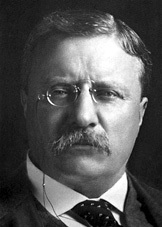
Theodore Roosevelt (Photo Source: NobelPrize.org)
Anti-Catholic venom is an overlooked reason why WASP America wanted to liberate Cuba from Spain during the Spanish American War.
Black soldiers were mistakenly thought to be immune from tropical diseases. That was one reason they were sent to fight in Cuba during the Spanish American war.
The “Buffalo Soldiers,” who were black men, fought bravely in Cuba during the Spanish American War. But Teddy Roosevelt who led the Rough Riders got the headlines and glory‹and later revised the story of what really happened to reap self-aggrandizing benefits.
President William McKinley professed to have been divinely inspired to annex the Philippines and “Christianize” this largely Catholic country during the Spanish American War.
The great American writer Mark Twain opposed American imperialism and wrote about replacing the American flag with one featuring black stripes and skull and crossbones.
Racist policies surrounded Teddy Roosevelt’s “Great White Fleet.” Black sailors who had served and fought on American ships since the Revolution, were kept from service except in the boiler rooms.
WORLD WAR II
Widespread sexual violence was inflicted on women during the Battle of Berlin. Among the causes: the practice of issuing vodka to the Red Army. The number of women raped by the Soviet troops in Berlin is estimated between 95,000 and 133,000, with as many as 10,000 deaths as a result—many from suicide; altogether two million German women are thought to have been raped by the Soviet Red Army troops.
The Red Army crushed the Nazis at the close of World War II but Cold War animosities kept their crucial role out of America’s “Good War” narrative.
General Dwight Eisenhower didn’t know the Germans had been developing atomic weapons or about the Manhattan Project when he agreed to let Stalin take Berlin.

Vietnam Fire Support Base (Model) at the US Army War College- Army Heritage and Education Center
THE VIETNAM WAR
As President, Eisenhower weighed and then dismissed using atomic weapons in Vietnam. Seeing what devastation the atomic bombs had wreaked on Japan influenced Eisenhower to not use these weapons again, especially against an Asian country.
When television news reports brought the “Living Room War” of Vietnam into American homes and showed how the U.S. Government was lying, reporters became as significant as the troops. The media let the public in on what was really going on– America was not winning the war.
Vietnam wasn’t only about Communism and “falling dominoes.” It was about Catholic versus Buddhist, government corruption and longstanding class differences inside Vietnam.
The Gulf of Tonkin Resolution, which gave President Johnson authority to widen America’s role in the Vietnam conflict, was drafted weeks before the questionable attack on American ships– which triggered the resolution.
The My Lai Massacre received wide media attention but purported atrocities and the killing of as many as 3,000 Vietnamese in the city of Hue got little notice.
THE WAR IN IRAQ
The battle for Fallujah exposed how little Americans knew about who was fighting the war in Iraq. “Handsome Johnny” had been replaced as a fighter as the war was being outsourced to private, for-profit contractors in Iraq in an unprecedented way. The American troops were once referred to as a “junior partner” in the war effort.
© 2015 Kenneth C. Davis All rights reserved
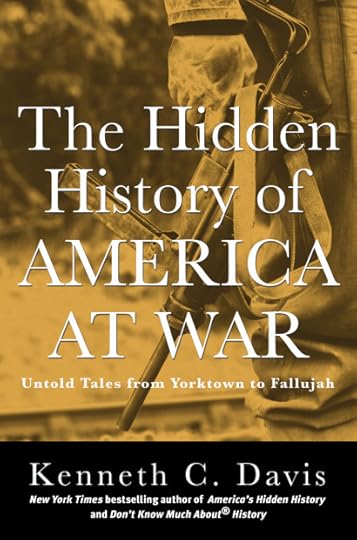
The Hidden History of America At War (Hachette Books Random House Audio)
Who Said It? Quiz (5/11/2015)
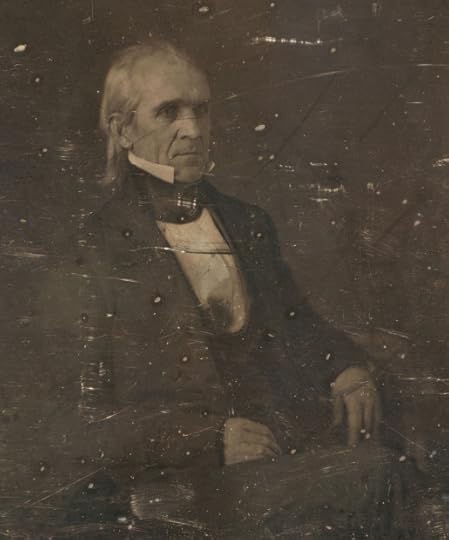
President James K. Polk (1849)
Mathew Brady, photographer Source: Library of Congress CALL NUMBER DAG no. 391
Answer: President James K. Polk, the eleventh President of the United States in a “Special Message to Congress on Mexican Relations” (May 11, 1846)
But now, after reiterated menaces, Mexico has passed the boundary of the United States, has invaded our territory and shed American blood upon the American soil. She has proclaimed that hostilities have commenced, and that the two nations are now at war.
As war exists, and, notwithstanding all our efforts to avoid it, exists by the act of Mexico herself, we are called upon by every consideration of duty and patriotism to vindicate with decision the honor, the rights, and the interests of our country.
Source and Complete Text: Online by Gerhard Peters and John T. Woolley, The American Presidency Project. http://www.presidency.ucsb.edu/ws/?pid=67907.
May 8, 2015
Speaking at RJ Julia Booksellers (Madison, CT) May 14
I am very excited to join RJ Julia Booksellers and the Madison Historical Society on Thursday May 14 to talk about
THE HIDDEN HISTORY OF AMERICA AT WAR.
Event date:
Thursday, May 14, 2015 – 7:00pm
Event address:
Allis-Bushnell House
853 Boston Post Road
Madison, CT 06443
This event is FREE. Click HERE to register.
Hope to see you there.

The Hidden History of America At War-May 5,2015 (Hachette Books/Random House Audio)
May 13-Speaking at Porter Square Books

The Hidden History of America At War-May 5,2015 (Hachette Books/Random House Audio)
On Wednesday May 13, I will be appearing at Porter Square Books in Cambridge Mass., to talk about my new book, The Hidden History of America At War: Untold Tales from Yorktown to Fallujah.
I hope you will join in.
For more information about Porter Square Books.
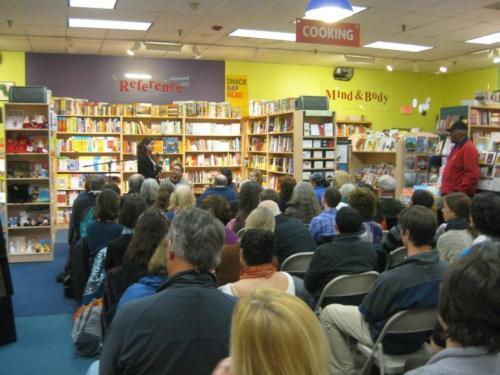
Don’t Know Much About® Harry S. Truman
Harry Truman “Gave’ Em Hell.” I gave him a A. Born on May 8, 1884, the 33rd President of the United States.
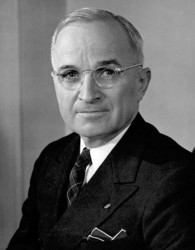
President Harry S. Truman
(Photo: Truman Library)
It was on his birthday in 1945 that Truman was able to tell Americans that the war in Europe was over with the surrender of Germany.
THIS IS a solemn but a glorious hour. I only wish that Franklin D. Roosevelt had lived to witness this day. General Eisenhower informs me that the forces of Germany have surrendered to the United Nations. The flags of freedom fly over all Europe. For this victory, we join in offering our thanks to the Providence which has guided and sustained us through the dark days of adversity.
Described as “a minor national figure with a pedestrian background,” Truman was a World War I veteran and a Senator from Missouri when Franklin D. Roosevelt chose him to become his running mate in the 1944 election. Truman became vice president when FDR won his fourth term and then took office on April 12, 1945 when FDR died.
When he took office, Truman had been largely left “out of the loop” by Roosevelt as World War II entered its final months. Truman did not know of the existence of the “Manhattan Project” and the development of the atomic bomb until he became president. Then he had to make the decision to use it against the Japanese.
Fast Facts
•Truman was a member of the Sons of the Revolution and the Sons of Confederate Veterans
•He wanted to attend West Point but poor eyesight kept him out. He enlisted in the Missouri National Guard and served as the commander of an artillery battery in World War I.
•Before entering politics, he was a farmer, bank clerk, insurance salesman and owner of a failed haberdashery store.
•As president he once threatened to punch the nose of a newspaper critic who had given his daughter a poor review after her debut singing recital. Margaret Truman went on to greater fame as a mystery novelist, beginning with Murder in the White House published in 1980.
•After Grover Cleveland, Truman is the only president who did not attend college. He attended law school briefly but dropped out.
After the end of World War II, Truman had to shift America’s attention to the new “Cold War” with the Soviet Union and his policies of “containment” and the Marshall Plan to rebuild war-torn Europe were hallmarks of his presidency.
Harry S. Truman died on December 26, 1972. This is his New York Times obituary. The Truman Library and Museum is located in Independence, Missouri
Read more about Truman, his life and administration in Don’t Know Much About® the American Presidents.
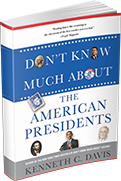
Don’t Know Much About® the American Presidents (Hyperion Paperback-April 15, 2014)
May 7, 2015
Mother’s Day-A “Hidden History”
Let me be among the first to say Happy Mother’s Day. Husbands and children everywhere: Don’t forget.
But amidst the brunches, flower-giving and chocolate samplers, there is a story of another “Mother’s Day” that is worth remembering this weekend.
Julia Ward Howe, a prominent abolitionist best known for writing “The Battle Hymn of the Republic,” published what became known as the “Mother’s Day Proclamation,” originally called “An Appeal to Womanhood Throughout the World.”
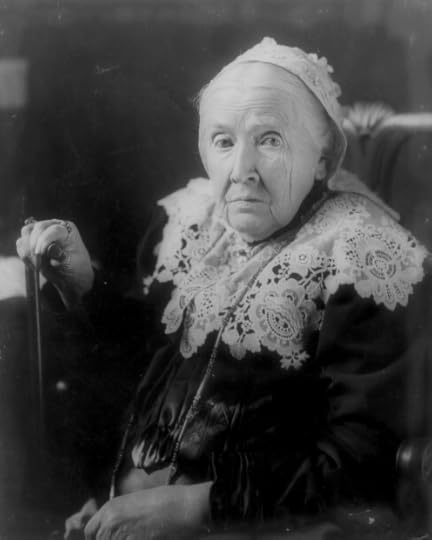
Julia Ward Howe (1907) Source: Library of Congress
In 1870, Howe wrote:
Our husbands shall not come to us reeking with carnage, for caresses and applause. Our sons shall not be taken from us to unlearn all that we have been able to teach them of charity, mercy, and patience. . . . From the bosom of the devastated earth a voice goes up with our own. It says, “Disarm, Disarm! The sword of murder is not the balance of justice! Blood does not wipe out dishonor nor violence indicate possession.
Source and Complete Text: Library of Congress
Howe’s international call for mothers to become the voice of pacifism found few takers. Even among like-minded women, there was greater urgency over the suffrage question. Her passionate campaign for a “Mother’s Day for Peace” begun in 1872 fell by the wayside.
Mother’s Day, as we know it, is not the invention of Hallmark; it started in 1912 through the efforts of West Virginia’s Anna Jarvis to create a holiday honoring all mothers for their sacrifice and to assist mothers who needed help.
Today, Mother’s Day is largely a commercial bonanza — flowers, chocolates and greeting cards. Is it possible to truly honor Howe’s version of Mother’s Day and work towards her original vision of Mother’s Day?
If only we remember the history behind the holiday and what she thought it should be.
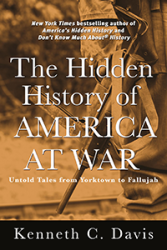
The Hidden History of America At War-May 5, 2015 (Hachette Books/Random House Audio)
May 6, 2015
Kirkus Review-The Hidden History of America At War
KIRKUS REVIEWSix turning points in military history and American democracy.
Don’t Know Much About… series author Davis (America’s Hidden History: Untold Tales of the First Pilgrims, Fighting Women, and Forgotten Founders Who Shaped a Nation, 2008, etc.) begins with the 1781 battle that decided the American Revolution. In Yorktown and its aftermath, we learn that George Washington favored a large standing army, despite the insistence of many that a diffuse corps of “citizen soldiers” would be a better safeguard of democracy. From Yorktown, the author moves to the 1864 Battle of Petersburg, Virginia. Davis defines specific moments when the U.S. military’s role and self-image changed significantly. His stories are always analytically rigorous, and thus he describes at length the so-called “water cure” as it was employed as a method of torture by Americans during the Spanish-American War. Throughout the book, the author is careful to emphasize the critical role of African-Americans, both in the acknowledged triumphs of groups like the U.S. Colored Troops and in the disgraces visited upon black servicemen. Davis also makes sure to give voice to the fact that the actions of the Greatest Generation were not always so valiant. Russians were not the only soldiers who left a swath of brutalized women in their wake. While the Americans were not given the same license as Soviet troops avenging more than 25 million casualties, they still committed crimes. Davis’ chapter on Vietnam offers a damning view of a military beset by those more interested in “management” than “leadership”—e.g., Gen. William Westmoreland. In the final chapter, on Fallujah, the author discusses the sickening scene of charred American mercenaries hanging from a bridge, failures of military policy, and a sense that the best military in the world is only as good as its civilian leadership.

The Hidden History of America At War-May 5, 2015 (Hachette Books/Random House Audio)
May 4, 2015
“War Stories”-The Hidden History of America At War
This video is a brief introduction to my new book, THE HIDDEN HISTORY OF AMERICA AT WAR: Untold Tales from Yorktown to Fallujah (to be published May 5, 2015 by Hachette Books and Random House Audio)
“His searing analyses and ability to see the forest as well as the trees make for an absorbing and infuriating read as he highlights the strategic missteps, bad decisions, needless loss of life, horrific war crimes, and political hubris that often accompany war.”
–Publishers Weekly *Starred Review Link Full Review
More Advance Praise for THE HIDDEN HISTORY OF AMERICA AT WAR

The Hidden History of America At War-May 5, 2015 (Hachette Books/Random House Audio)
“There’s only one person who can top Kenneth C. Davis—and that’s Kenneth C. Davis. With The Hidden History of America at War, he’s composed yet another brilliant, thought-provoking, and compelling book. . . Davis offers a hard-hitting and sometimes critical look at some of the most consequential wartime decisions made by presidents and policy makers, but his admiration and respect for the men and women who have served and sacrificed so much for this nation is unwavering.”
—Andrew Carroll, editor of the New York Times-bestsellers War Letters and Behind the Lines
“With his trademark storytelling flair, Kenneth C. Davis illuminates six critical, but often overlooked battles that helped define America’s character and its evolving response to conflict. This fascinating and strikingly insightful book is a must-read for anyone who wants to better understand our nation’s bloody history of war.”
—Eric Jay Dolin, author of Leviathan and When America First Met China
“A fascinating exploration of war and the myths of war. Kenneth C. Davis shows how interesting the truth can be.”
—Evan Thomas, New York Times-bestselling author of Sea of Thunder and John Paul Jones



